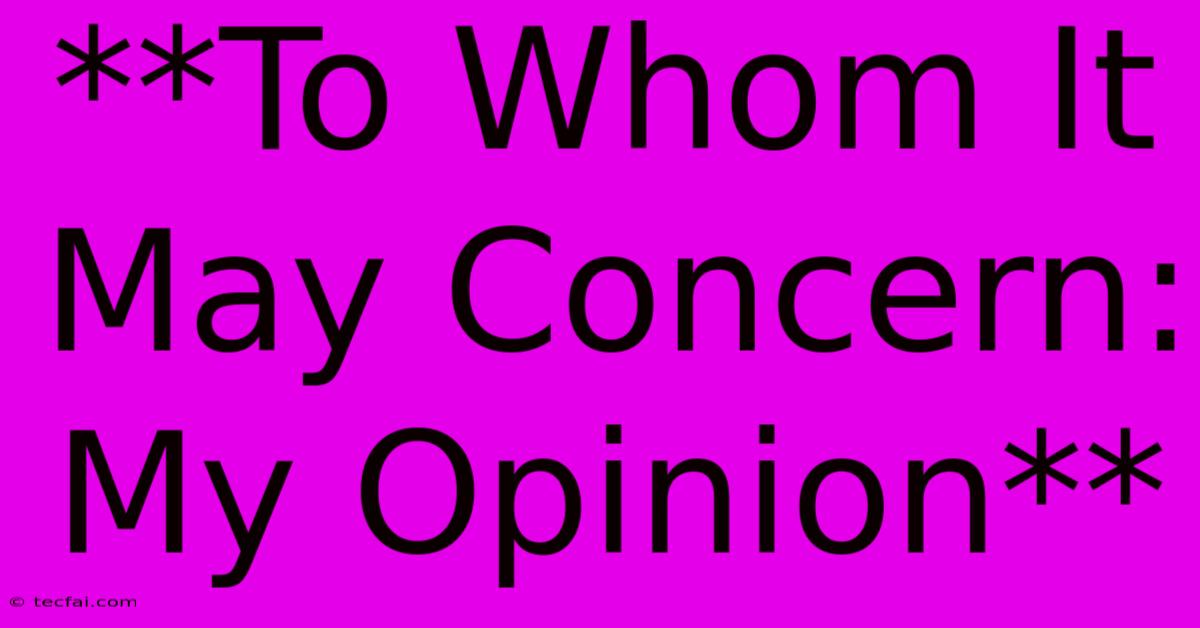**To Whom It May Concern: My Opinion**

Discover more detailed and exciting information on our website. Click the link below to start your adventure: Visit Best Website tecfai.com. Don't miss out!
Table of Contents
To Whom It May Concern: My Opinion
The phrase "To Whom It May Concern" is a ubiquitous one, often found at the beginning of formal letters and emails. While its intent is clear - to address a recipient whose identity is unknown - it can feel somewhat impersonal and even outdated.
In this age of digital communication, where personalization is key, is it time to reconsider this antiquated phrase? Let's delve into the reasons why using "To Whom It May Concern" might not be the most effective way to begin your correspondence.
The Impersonal Touch
The phrase itself carries an inherent lack of personalization. It's like sending a message in a bottle - you know it's going out into the world, but you have no idea who will pick it up. This can lead to the recipient feeling like their time is not valued, as if you're not truly invested in reaching out to them specifically.
A Sign of Lack of Research
In many situations, finding the name of the recipient is a simple matter of a quick search online or contacting the relevant department. Using "To Whom It May Concern" suggests that you haven't put in the effort to find the right person, which can come across as lazy or disinterested.
A Faded Formalism
While the phrase is rooted in formality, the modern workplace demands a more personal touch. This doesn't mean sacrificing professionalism, but rather, demonstrating genuine interest and respect for the recipient. A simple "Dear Hiring Manager" or "Dear [Department Name]" can go a long way in establishing a positive impression.
When "To Whom It May Concern" May Be Appropriate
While generally discouraged, there are specific situations where "To Whom It May Concern" can be acceptable:
- Anonymous Feedback: When leaving anonymous feedback or a general complaint, the phrase is suitable.
- Formal Public Notices: In formal public notices or official documents where the recipient is unknown, the phrase maintains a degree of formality.
A More Effective Approach
If you're unsure about the recipient's name, consider these alternatives:
- "Dear [Company Name] Hiring Team": A general yet respectful address for job applications.
- "Dear [Department Name]": A neutral greeting for general inquiries.
- "To the [Specific Team or Department]": A slightly more formal alternative when the exact name is unknown.
Ultimately, the key is to strive for a balance between professionalism and a personalized touch. While "To Whom It May Concern" may have served its purpose in the past, in today's world, it's time to move beyond this impersonal approach and embrace the power of a little personal touch.

Thank you for visiting our website wich cover about **To Whom It May Concern: My Opinion**. We hope the information provided has been useful to you. Feel free to contact us if you have any questions or need further assistance. See you next time and dont miss to bookmark.
Featured Posts
-
Fox News Dominates Us Election Viewing
Nov 06, 2024
-
Nike Zoom Vomero 5 Kulay Dark Team Red
Nov 06, 2024
-
Proper Hand Washing For All Clothes
Nov 06, 2024
-
Sporting Upsets City 4 1 Rubens Man Utd Debut Looms
Nov 06, 2024
-
Embiid Suspended Nba Disciplines Sixers Star
Nov 06, 2024
